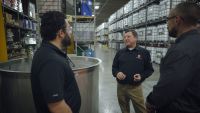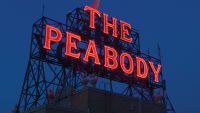Contractor to Contractor: Harold F. Johnson Masonry, Inc.
By Masonry
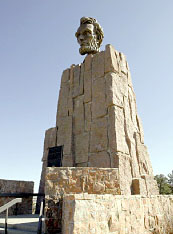 Harold F. Johnson Masonry, Inc., Cheyenne, Wyo.
Harold F. Johnson Masonry, Inc., Cheyenne, Wyo.
For Jim Johnson, masonry has been a family trade for more than 100 years. Johnson's grandfather, Louis Johnson, started in the masonry field in 1898, followed by his son, Harold, in 1944. Following in his family's footsteps, Johnson began working with masonry in high school and has pursued his love for the trade ever since. As the president of Harold F. Johnson Masonry, Johnson has helped continue to build the family company by adding commercial, educational, government, historical restoration, industrial, institutional and landscaping work. He took time to talk with Masonry about his company's history, some of the more difficult obstacles he's faced, and where he sees the future of the masonry industry.
Masonry: Tell us about Harold F. Johnson Masonry's (HFJ) history.
Johnson: My grandfather started laying brick a little before the turn of the century in western Nebraska, Wyoming and Colorado. In 1918, he started working out of Cheyenne. He did some contract work, but he was primarily a bricklayer and ran jobs. He was the president of the Bricklayer's Local, and he died in 1936.
He taught my father, and my father started the trade around 1927 or 1928, working out of Cheyenne and surrounding areas ever since. He started his business, Harold F. Johnson Masonry, in 1944. There was hardly any equipment to speak of in those days. There were a lot of good bricklayers and real craftsmen, and they did travel a fair amount; the Denver area was always huge and always a brick town.
 I started working for my father during the summer months in high school and through a couple years of college. I went on to become a partner in the business and, as time went on, I ended up owning the business.
I started working for my father during the summer months in high school and through a couple years of college. I went on to become a partner in the business and, as time went on, I ended up owning the business.
Masonry: You have third- and fifth-generation masons working for your company. Do you feel having employees with this long-term, family involvement in masonry adds depth to your company and its knowledgebase?
Johnson: I really do. There were some methods and terms that were passed on from my grandfather to my father, and then to me. There are a lot of methods and types of work that aren't done anymore, and the terminology has gone away. But, when you do know these methods when you're working on these old buildings, you can understand how they were done - blind headers and such terminology - that most people today aren't aware of. You can see these jobs and how they were done, and you can better understand how they did it in those days.
Masonry: Your company completes everything from commercial and residential masonry to historical restoration and landscaping. Tell us how you've amassed such a diverse portfolio.
 Johnson: That was kind of a combination of need and interest. On the need side, it's a fact that, in this area you have to be versatile. We don't have the volume of work of any one type to keep busy. Having a diverse scope of work helps a lot.
Johnson: That was kind of a combination of need and interest. On the need side, it's a fact that, in this area you have to be versatile. We don't have the volume of work of any one type to keep busy. Having a diverse scope of work helps a lot.
On the interest side, we especially run into the historic restoration work. It comes from a respect for the effort put into the older masonry structures. And I think that we feel an obligation to repair them - to rebuild the masonry from the time when there was no doubt that this was the premier building product. It was definitely the best product then, and it still is today.
Masonry: Wyoming faces about six months out of the year with temperatures below freezing. How do you deal with these temperatures when you're completing masonry work for a living?
Johnson: It's like that for the whole northern band of the country. We've been blessed out here in a way because we're in somewhat of a drought situation, and the last eight or 10 years have been very mild winters.
The wind has been a constant factor my whole life. ... Combine that with the cold weather and it can really test your ability to maintain winter protection in enclosures. I had it drilled into my head when I was young that there's no such thing as bad weather, just bad clothing. The same is true for the winter protection. You have to put the right kind of suit on your building, so to speak, to maintain the heat. Sometimes you just can't do it.
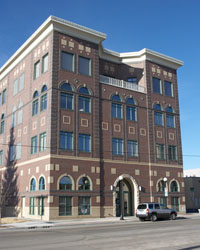 Masonry: You are a Certified Mason Contractor through the Rocky Mountain Masonry Institute. How has this certification aided you in your business?
Masonry: You are a Certified Mason Contractor through the Rocky Mountain Masonry Institute. How has this certification aided you in your business?
Johnson: When I saw that they were making this program, I thought it was a good idea. And from a personal point of view, I wanted them to do it from the beginning, just for my own satisfaction. I also thought that the industry needed to have a level of education that should be a minimum requirement for contractors in this field.
As far as helping our business, I think it gives us some better credentials and [enables us to] be better prepared to do a better job.
I do believe that our industry is going to step up, and I see that happening a lot across the country. The Rocky Mountain Masonry Institute is a regional contractor association that seems fairly aggressive; you see a lot about them and they have a lot of programs going on.
Masonry: Your website describes the emphasis your company places on having a safe working environment. Tell us about some of the measures you've taken to ensure workplace safety.
Johnson: We really strive to have safety the focus on our job sites. I have to admit that the everyday diligence is hard to maintain. We have company safety classes, require all scaffolding to comply with standards, and we maintain equipment. Also, we provide the personal safety equipment for everyone.
 We really do believe that when you go to work, it shouldn't be at a place where you're going to compromise your personal safety. When you have a site where you have multiple contractors, you've really got to work together to look out for hazards. I have to emphasize that it has to come from the top down. We have to have compliance to deal with these rules and regulations and methods, and you can't negotiate it. I really feel, though, that it's one of the places where we can improve a whole lot because we still see people being hurt in ways that are so easy to avoid.
We really do believe that when you go to work, it shouldn't be at a place where you're going to compromise your personal safety. When you have a site where you have multiple contractors, you've really got to work together to look out for hazards. I have to emphasize that it has to come from the top down. We have to have compliance to deal with these rules and regulations and methods, and you can't negotiate it. I really feel, though, that it's one of the places where we can improve a whole lot because we still see people being hurt in ways that are so easy to avoid.
Masonry: Looking back over the years, what was your most difficult masonry project and how did you overcome the obstacles?
Johnson: I think you have to be ready to overcome the obstacles that all jobs present, and hopefully that's part of your job - to see those things and anticipate them. We've done a lot of pretty challenging jobs in terms of heights, methods and scaffolding systems to do some very odd configurations of buildings.
We've done a lot of really great, beautiful masonry jobs, but I think the one that was really interesting was an industrial-type job. It was some 12-inch block, reinforced, baffle walls inside of a 30-million gallon water tank. There were 12-inch block walls that went up 28 feet tall, and each one was probably 260 feet long that started at alternating sides of the concrete structure, and they were just baffles for the water in the tank.
 We stocked most of the block in there prior to the roof being completed, but at some point they had to proceed with the roof, and we ended up with the 12-foot by 12-foot hole in the roof. So we had to complete the masonry operations with the mortar and the grout going through this hole in the roof. The forklift had to have all the fluids drained out of it, be picked up with a crane, and then lowered down the hole. Then we had to put the fluids, fuels and hydraulics back in order to use it for managing our equipment and materials for the rest of the project. ... It was a very interesting job that no one will ever see - placing the grout and the blocks, the lighting and ventilation - everything you had to address to accomplish that job.
We stocked most of the block in there prior to the roof being completed, but at some point they had to proceed with the roof, and we ended up with the 12-foot by 12-foot hole in the roof. So we had to complete the masonry operations with the mortar and the grout going through this hole in the roof. The forklift had to have all the fluids drained out of it, be picked up with a crane, and then lowered down the hole. Then we had to put the fluids, fuels and hydraulics back in order to use it for managing our equipment and materials for the rest of the project. ... It was a very interesting job that no one will ever see - placing the grout and the blocks, the lighting and ventilation - everything you had to address to accomplish that job.
Masonry: What do you feel is the biggest misconception about the masonry industry?
Johnson: I feel the skill level of our craftsmen in the masonry business is unsurpassed by any of the other construction trades. There's something about the trowel and the hand that really separates the 'erector-set' kind of trades. I'm not belittling anyone, but it's really a craft that's underrated. It looks easy, but to do it is a whole different story. The technology, the materials, the methods and way they've changed over the last 20 years is growing by leaps and bounds. You look at these things, and it's the same as the old days, but you have better methods of equipment now.
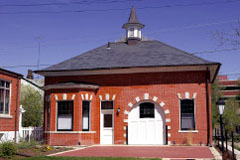 Masonry: Where do you think the masonry industry is going to be 10 years from now?
Masonry: Where do you think the masonry industry is going to be 10 years from now?
Johnson: ... People are looking for products that can serve a 50- to 100-year life cycle, but we have to be able to provide the manpower and expertise to get them built. The [masonry] building is kind of coming back, but maybe not the infrastructure - people-wise and contractor-wise - to get them all done. We have to have the skills to match the jobs that are coming. Those two lines are going to cross, and I don't know if they're going to get covered. I think that means that the industry needs to step up their education, and that's where the contractors groups come in.
Masonry: What do you think will be the masonry industry's biggest competitor in 10 years?
Johnson: I guess faux masonry in some form. EIFS and pre-cast - all the alternatives we have to masonry - always hype themselves in what they look like. Our challenge is to be capable of giving them the real thing. I think we're there, but it's kind of interesting how most of their ads say "looks like brick" or "looks like stone." In the long term, though, they will run their course. The real thing is the best way to go.
Masonry: What do you feel are the most critical issues you'll face with future government regulations?
Johnson: That would be practicality. Our government regulations are for our own good, and I really want to believe that, but they really need to work with the people and the entities for the solutions and not create hurdles. We are the government, so we should be able to work together and make our companies the standard for the world and our products the best. You see that more now than you did 15 years ago. But they really do need to go to the crafts and the entities involved and work out the regulations.
Masonry: What do you like most about being a member of the MCAA?
Johnson: The fact that you're part of a greater force in this industry that represents us. On a daily basis, they're knocking on the doors at local and national levels, striving to improve the business as an industry. It's a great source of information for everybody, and you get to put input in, too. It's a fairly simple deal. You just need to join, and I guess the rest is up to the individual. You can get out as much as you put in. It's the standard you achieve and the professionalism that you see.
About the Author
Masonry, the official publication of the Mason Contractors Association of America, covers every aspect of the mason contractor profession - equipment and techniques, building codes and standards, business planning, promoting your business, legal issues and more. Read or subscribe to Masonry magazine at www.masonrymagazine.com.











